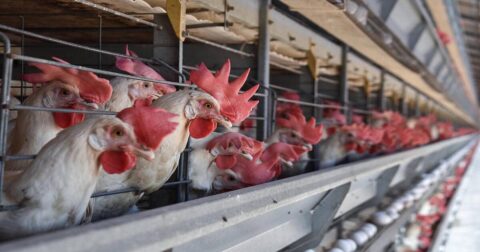Investigation
Oklahoma’s Loophole: How Tyson’s Water Use Goes Unchecked
Food•15 min read
Reported
A poultry processing company in Singapore offers up its waste to cultivated meat companies. But should they use it?


Words by Markos Hasiotis
Most of the world eats meat that is procured and processed in a way that slaughters billions of living creatures and severely damages the environment. To give just one example of the damage — food-related emissions are responsible for between a quarter and a third of all greenhouse gas emissions.
One potential alternative to animal farming, with its harms to animals and the planet, is cultured meat. Cultured meat goes by many names — lab-grown meat, cell-based meat, cultivated meat and even the short-lived “clean meat.” All of these refer to meat that is artificially grown from animal cells rather than cut from the body of a slaughtered animal.
Yet it’s still early days for the industry and there are significant challenges to widespread commercialization. A new partnership in Singapore aims to help the industry inch closer to viability but the collaboration raises questions about just how much cultured meat companies should rely on the animal agriculture business for sourcing.
Poultry processing firm Leong Hup Singapore announced a new partnership on July 5 with the academic institution, Nanyang Technological University (NTU). One of the goals of this collaboration is to help the poultry facility become “zero-waste” by converting discarded feathers (that would otherwise be incinerated or buried in landfills) into packaging.
The new partnership also aims to boost production of cultivated meat by creating a new type of growth medium made from leftover chicken blood and bones. But this new medium solves one industry problem — cost — without addressing the ethics of animal slaughter.
“Growth medium” is the term used to describe the nutrient-rich solution used to “feed” animal cells to grow them into a tangible piece of meat. Cultured meat makers have historically relied on fetal bovine serum (FBS) as the source for this medium.
Derived from the blood of unborn calves collected from pregnant cows killed in slaughterhouses, fetal bovine serum is both expensive and sourced from animal farming. Switching from FBS to poultry waste would be significantly cheaper and easier to source.
In 2020, Singapore became the first country in the world — in fact, the only country, to date — to approve the sale of a cultured meat product for human consumption.
Singapore was the first country to make cultured meat meals available through home delivery in 2021, and the cultured meat company Shiok Meats, headquartered in Singapore, was the first in the industry to develop cultured crab meat, at least for a few select taste testers.
According to a 2021 report from the Good Food Institute, there are more than 170 startups around the world dedicated to cultured meat. The field has collectively raked in over one billion dollars in investment.
On a molecular level, cultured meat is identical to conventional meat. Mince or ground products that don’t require a structure like steak are especially close in taste and texture, and easier to produce.
William Chen, Director of NTU’s Food Science and Technology programme who is co-leading the collaboration, expressed confidence for the future of cultured meat, describing it as having “the potential to reduce and even one day end the slaughter of farm animals and the impact rearing farm animals has on the environment.”
For industry boosters, cultured meat is touted as a viable alternative protein because of its unique ability to satisfy the taste buds of meat-eaters while causing much less harm to animals and the planet.
According to a 2011 study funded by New Harvest, a research institute dedicated to cultured meat, cultured meat can be produced using up to 45 percent less energy, 96 percent less water and 99 percent less land than conventional meat, with up to 96 percent savings in greenhouse gas emissions to boot.
Cultured meat could also drastically reduce the risk of zoonotic diseases since it involves no contact with live animals, other than sourcing the growth medium.
Despite the potential benefits, the cultured meat industry is not without its persistent challenges, and the Leong Hup Singapore-NTU partnership demonstrates just how difficult it might be for the industry to break ties with the animal farming sector.
Poultry waste is abundant and cheap for sourcing — the world consumes a lot of chicken — but industrial poultry farms are also one of the least humane forms of livestock operations, responsible for the slaughter of 9 billion chickens per year in the U.S. alone.
Many cultured meat companies are developing animal-free serums instead. Cultured meat companies are notoriously protective of their intellectual property, so it’s difficult to know just how many companies are truly using these alternatives and at what scale. Startups like Mosa Meat and IntegriCulture have touted their progress, however, with Mosa Meat publishing a peer-reviewed paper in January 2022. Aleph Farms says it’s also working towards a serum-free alternative.
Although cultured meat is not yet available for mass consumption, facilities designed to produce it on a large scale are starting to spring up. One opened in Israel in 2021; another is currently being built in Singapore.
The company Good Meat also announced this year that the U.S. would be constructing ten enormous bioreactors with which to grow cultured meat. It’s estimated that by 2026, the bioreactors will be producing thousands of tons of meat a year.
As the industry inches towards commercialization on a global scale, cultured meat companies ought to confront ethical questions about sourcing in a transparent way.
One model for this might be a conference held in April that created space for conversations about the “cultural implications” of lab-grown meat between cultured meat companies and Indigenous Peoples and their elders. Something similar could move conversations about transparency around sourcing forward — and offer a chance for animal ethicists and activists that passionately condemn cultured meat to weigh in on the industry’s future.